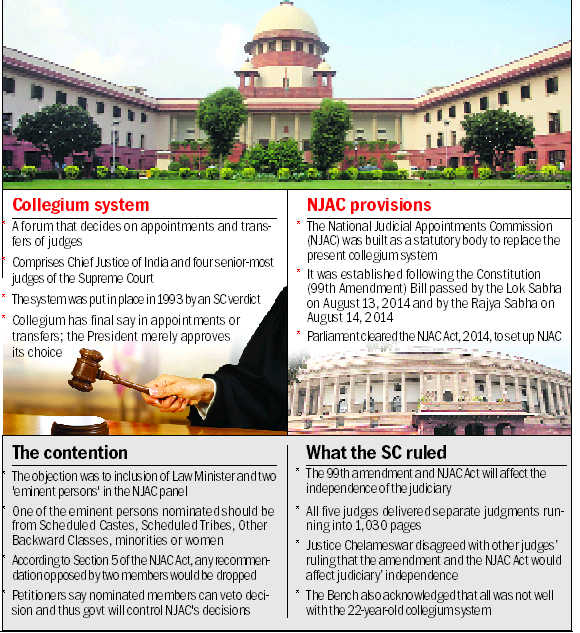Note4Students
From UPSC perspective, the following things are important :
Prelims level: Collegium system, NJAC
Mains level: Judicial appointment opacity issue

VP asked the two Houses for not taking cognizance, over the last seven years, of the 2015 Supreme Court judgment setting aside the Constitutional amendment to constitute the National Judicial Appointment Commission (NJAC).
Background
- Since few days, Judiciary and Executive are at loggerheads.
- VP pointed out that the amendment had been passed with unprecedented support by both Houses and approval from 16 State Assemblies.
- However, on October 16, 2015, the Supreme Court ruled that it was not in consonance with the basic structure of the Constitution, and scrapped the legislation.
What was NJAC?
- The NJAC was a body which was proposed to make appointments of Chief Justices, Supreme Court judges, and High Court judges in a more transparent manner as compared to the existing collegium system.
- It sought to replace the Collegium System.
- It was proposed via the National Judicial Appointments Commission Bill, 2014.
- The bill was passed by both the houses; Lok Sabha and Rajya Sabha, and also received the President’s assent.
- The commission was established by the 99th Constitutional Amendment Act, 2014.
- The Act proposed that the members of NJAC would be composed of members from the legislative, judicial, and civil society.
Composition of NJAC
- Chief Justice of India would be the Chairman of the NJAC
- Two senior-most judges of the Supreme Court
- The Law and Justice Minister
- Two eminent persons would be selected by a committee which would be composed of the Prime Minister, the Chief Justice of India and the Leader of Opposition
Why was the NJAC Act struck down?
- The five-judge SC bench struck down the NJAC Act along with the 99th Constitutional Amendment Act in a 4:1 ratio.
- It was repealed by a five-judge bench, famously known as the Fourth Judges Case, 2015.
- It was termed ‘unconstitutional’ and was struck down, citing it as having affected the independence of the judiciary.
Benefits of the NJAC Act
Justice Chelameshwar praised the NJAC Act because-
- Transparent process: It involved a smooth and transparent process for the appointment of judges.
- Brings checks and balances: the exclusion of checks and balances principle leads to the destruction of the basic structure of the Constitution.
- Seeks balance of power: In a democratic setup, the executive cannot be completely excluded.
- Global examples: In the dissent order, an example of the United States of America was given, where the head of the Executive is conferred with the power to appoint the judges.
Issues with collegium system
- Alleged favouritism: The collegium system does not provide any guidelines or criteria for the appointment of the Supreme Court judges and it increases the ambit of favouritism.
- Ambiguous process: The absence of an administrative body is also a reason for worry because it means that the members of the collegium system are not answerable for the selection of any of the judges.
- Isolating the executive: The check and balance principle is necessary because it ensures that no organ of democracy is exercising its power in an excessive manner.
- Extra-constitutional nature: The collegium system tells us that even though the collegium system is not mentioned anywhere in the Constitution, rather it has evolved over a period of time from different landmark cases.
- Lack of transparency: Nepotism has been often witnessed in the judiciary due to a lack of criteria for the appointment of judges.
What can we, as aspirants, observe here?
- After analyzing both NJAC and the collegium system, it can be inferred that neither of the methods is complete and both lack certain aspects.
- Many former judges and legal experts are supporting the NJAC.
- However, legal jurists are divided on NJAC, with some supporting it while others calling for amendments to the Act.
- It is quite evident that neither the collegium system nor the NJAC is accurate; both have some shortcomings.
Way forward
- NJAC needs to be amended to keep the judiciary independent.
- According to Justice Deepak Gupta, retired senior civil servants need to be inducted into the body appointing judges.
- The Supreme Court needs to lay down certain guidelines for appointing judges and those guidelines should be strictly followed and codified.
- Apart from that, all the notifications should be issued in the public domain to make the process more transparent.
Click and get your FREE Copy of CURRENT AFFAIRS Micro Notes
Get an IAS/IPS ranker as your 1: 1 personal mentor for UPSC 2024
